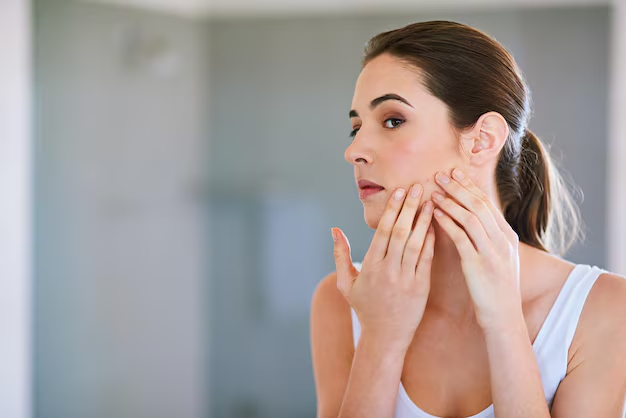Tackling Hormonal Acne: What You Need to Know
Hormonal acne can feel like an uninvited guest that just won’t leave. Whether you’re a teenager dealing with the first signs of acne or an adult shocked by an unexpected breakout, knowing how to manage hormonal acne is essential. Fortunately, understanding its triggers and learning effective management strategies can transform how you deal with this persistent issue. Let's dive into how you can take control and treat hormonal acne efficiently.
Understanding Hormonal Acne
What is Hormonal Acne?
Hormonal acne, as the name suggests, is acne influenced by fluctuations in hormone levels. Typically affecting the lower face, jawline, and neck, it manifests as deeper cystic lesions rather than superficial blackheads or whiteheads. This type of acne is particularly common during puberty, menstruation, pregnancy, or stress—when hormones such as androgens increase.
Key Points to Understand:
- Hormonal acne appears as cysts or nodules.
- It often occurs cyclically, in tandem with the menstrual cycle or other hormonal changes.
- Adults, especially women, can experience hormonal acne well into their 30s and 40s.
Identifying Triggers
The first step in treating hormonal acne is identifying what triggers it. Hormones such as androgens can increase the production of sebum, the oily substance in your skin, leading to blocked pores and acne. Understanding these triggers can help in managing or even preventing outbreaks.
Common Triggers Include:
- Stress: Releases cortisol, which can exacerbate acne.
- Diet: Foods high in sugar and dairy may influence hormonal fluctuations.
- Lifestyle: Lack of sleep and poor skincare habits can promote acne.
Treatment Options for Hormonal Acne
Skincare Routine
Crafting a skincare routine tailored to treat hormonal acne is crucial. While over-the-counter products can help, being mindful of the ingredients in your products is vital. Look for key components like salicylic acid, benzoyl peroxide, and alpha hydroxy acids (AHAs), which help in unclogging pores and reducing inflammation.
A Simple Routine Might Include:
- Cleansing: A gentle cleanser with salicylic acid to reduce sebum and clear pores.
- Exfoliating: Using AHAs once or twice a week to remove dead skin cells.
- Moisturizing: Non-comedogenic moisturizers to maintain skin hydration.
- Spot Treatment: Benzoyl peroxide to target and reduce inflammation.
Dietary Adjustments
Many people find that adjusting their diet can lessen hormonal acne symptoms. While diet alone might not clear skin entirely, certain foods can help minimize breakouts.
Consider These Dietary Tips:
- Reduce Sugar Intake: High sugar levels can lead to increased acne.
- Limit Dairy: Some find dairy, especially milk, exacerbates acne.
- Incorporate Omega-3 Fatty Acids: Found in fish, flaxseeds, and walnuts, omega-3s can reduce inflammation.
Lifestyle Changes
A healthy lifestyle can have a profound impact on managing hormonal acne. Simple changes can improve overall skin health and reduce the frequency of acne flare-ups.
Lifestyle Adjustments to Consider:
- Exercise Regularly: To boost blood circulation and reduce stress hormones.
- Get Adequate Sleep: To regulate hormones and boost skin repair.
- Practice Stress Management: Techniques like meditation and yoga can lower stress levels.
Non-prescription Treatments and Remedies
Over-the-counter Treatments
OTC remedies can be useful in controlling mild to moderate hormonal acne. Look for treatments with scientifically backed ingredients to ensure effectiveness.
Beneficial Ingredients:
- Glycolic Acid: An AHA that aids in exfoliation and removing dead skin cells.
- Retinoids: Vitamin A derivatives that promote cell turnover and reduce cyst formation.
Natural Remedies
Natural remedies are gentler options that can complement other treatments and are often effective in calming skin inflammation and preventing new acne lesions.
Popular Natural Options:
- Tea Tree Oil: Has antibacterial properties that can reduce acne-causing bacteria.
- Green Tea Extract: Contains antioxidants that may help reduce inflammation and sebum production.
When to Seek Professional Help
Dermatological Treatments
For persistent, severe hormonal acne, consulting with a dermatologist can be beneficial. They can provide prescriptions that target the underlying hormonal causes more effectively than over-the-counter options.
Possible Prescription Treatments:
- Oral Contraceptives: Can stabilize hormone levels in women.
- Spironolactone: A medication that reduces androgens and decreases oil production.
- Topical Retinoids: Stronger versions prescribed for severe cases.
Professional Procedures
In some cases, dermatologists might recommend professional procedures. These treatments can provide more rapid results, especially when over-the-counter products don’t suffice.
Advanced Treatments Include:
- Chemical Peels: Helping to exfoliate and clear the skin.
- Light Therapy: Using specific light wavelengths can reduce acne-causing bacteria and inflammation.
- Microdermabrasion: Physically removes top skin layers to reveal clearer skin beneath.
Embrace Your Journey to Clearer Skin
Living with hormonal acne can be challenging, but with the right strategies and a little patience, you can manage it effectively. Remember to tailor your approach to what your skin uniquely needs, combining proper skincare, diet, and lifestyle changes to see improvements. When standard remedies aren’t enough, don’t hesitate to consult a dermatologist for more targeted treatments.
Your Steps to Better Skin:
- Build a targeted skincare routine.
- Adjust your diet to support skin health.
- Make lifestyle changes to promote overall wellbeing.
- Explore natural and OTC treatments as initial remedies.
- Seek professional advice if necessary.
In your journey to clearer skin, consistency and patience are your best allies. Empower yourself with knowledge and proactive habits, and you'll be on your way to managing hormonal acne effectively.
🌟 Quick Summary:
- 🧴 Skincare Routine: Focus on cleansers with salicylic acid, exfoliating acids, and spot treatments.
- 🥗 Diet Adjustments: Limit sugar and dairy, incorporate omega-3s.
- 💤 Lifestyle Changes: Exercise, get adequate sleep, and practice stress management.
- 💡 OTC & Natural Remedies: Use tea tree oil and green tea extract for mild symptoms.
- 👩⚕️ Seek Help: For severe cases, consider dermatological treatments like retinoids or hormonal therapies.

